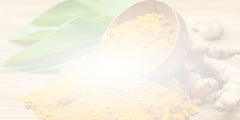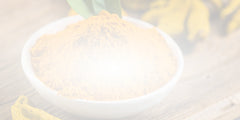
The ever-growing prevalence of turmeric as a dietary supplement has led to a spike in the root's consumption. However, even as the benefits of turmeric are expanded upon, people have difficulty finding the best ways to maximize them. Not everyone is aware that getting the most out of your turmeric is a more involved process than simply ingesting it, and you will have to take steps to ensure you are getting what you need out of it.
There are proven methods to help boost the way your body processes turmeric and curcumin and make sure the benefits for which they are lauded are more easily accessible. With this article, we hope to provide a guide on how to supplement your intake of turmeric and curcumin so that you can ensure you are getting the most out of them.
Turmeric vs. Curcumin
The first thing we need to clarify is that turmeric and curcumin are indeed two separate things. However, that does not necessarily make them both viable for the health benefits you are likely trying to gain. Curcumin itself is a compound found within turmeric and is responsible for the long list of health benefits associated with the spice. This difference means that there is nothing to boost with turmeric in and of itself since the root is not responsible for the benefits.

The curcumin, on the other hand, is where all the main benefits lie. Curcumin comes with a wide array of highly beneficial health effects that are being backed by research. Granted, this research is still young, but the results are promising enough that bolstering your curcumin intake is a wise move. For example, curcumin is a highly efficient anti-inflammatory that can serve as an excellent way to enhance your body's ability to fight off more severe conditions like heart disease. It is also an antioxidant and can even promote enhanced neurological activity.
There are some other tentative benefits like potential safeguards against certain cancers and Alzheimer's. These particular effects are extremely young in the research to back them, but the potential is evident.
To that end, your main goal should be employing methods to enhance the effects of curcumin, which is a more complicated matter than you might imagine. Curcumin, while highly beneficial, is not easily absorbed by the body.
The Bioavailability of Curcumin
The primary issue with getting the most out of turmeric and curcumin is the fact that it has a remarkably low level of bioavailability. The reality is that turmeric itself is not inherently beneficial beyond adding some spice and vegetable matter to your diet. Turmeric's main benefit is that it is a host for the curcumin that is actually responsible for the health benefits you are most likely after. Unfortunately, despite being a separate substance from turmeric, curcumin suffers from low bioavailability.
Bioavailability refers to how effectively the body can absorb substances. Curcumin has a low bioavailability, meaning you cannot get as many of the nutrients that help your body overall. This low bioavailability is especially so for turmeric, whose concentration of curcumin is very low.

Turmeric only contains around 3.14% curcumin by weight, so a low bioavailable substance is low in concentration in the product that is supposed to serve as its carrier. Despite this, there are ways to help enhance the bioavailability of curcumin so that your body has an easier time absorbing it. However, the efficiency of curcumin as a supplement is not solely predicated on the bioavailability of the curcumin but on the method you use to introduce it to your system.
Do Not Leave Any Behind
If you are determined to eat the turmeric as-is rather than use a supplement of some sort, then you cannot afford to leave leftovers that can rot. While a primary source of curcumin, turmeric is also composed of several other compounds that make it a healthy and tasty addition to your diet. This is where that low curcumin percentage per unit weight comes into effect. If you plan to use the genuine article to gather the effects that curcumin is known for, you need to be willing to consume the entire root to ensure that you are not missing out on any of the curcumin.

In fact, the traditional use of turmeric in early Asian folk medicine had them using the entirety of the root for their purposes. Therefore, using the natural form of turmeric can be a healthy addition to your regular diet and is a highly valuable root. Still, the low curcumin concentration and its low bioavailability render using pure turmeric a lesser method when compared to other options.
The Power of Piperine
What might come as a shock is that a common seasoning is actually highly beneficial in enhancing the bioavailability of curcumin. For example, black pepper is a common sight in any household, restaurant, or grocery store, and is also the source of a highly beneficial compound called piperine. Piperine was originally identified in 1819 and has since become a marvelous companion to curcumin. It has a very handy effect of enhancing the bioavailability of other compounds.

The piperine within black pepper has been studied concerning its effects with curcumin. The studies linked piperine to a spike in the absorption rate of curcumin by the body. The spike itself reached about a 2,000% increase from normal, making the effects of curcumin more pronounced since your body will have an easier time absorbing it. The best part is that you do not even need an excess of black pepper to get the piperine effect in your curcumin. For example, 20mg of piperine mixed in with a 2g serving of curcumin is all it takes to spike the absorption rate of the latter into our bloodstreams.
Piperine's effect on curcumin bioavailability is not fully understood, but two theories are currently being considered. The first theory is that the piperine makes it easier for curcumin to pass through the intestinal wall, which serves as a direct path into the bloodstream. The second theory is that the piperine can slow down the liver's curcumin breakdown process and give it more time to build a presence in your system.
In either case, the piperine/curcumin combination is an excellent tool for bolstering the effect of curcumin in the system since it allows your body to get ahold of the substance. As for how to combine the two, there are a few methods you can employ. The most obvious method is to cook a meal using turmeric that is seasoned with black pepper. Alternatively, and ideally, you can use curcumin supplements produced to extract the curcumin directly to maximize its effects and are made with piperine included.
Use Healthy Fats
The word "fat" might seem like a daunting term when discussing ways to get healthy, but some fats are very beneficial to one's health. This effect is especially true if you are looking to maximize the benefits of curcumin. Turmeric, and by extension the curcumin within, is fat-soluble, which means that something dissolves when mixed with fat and binds to it.
The cool thing about fats is that it takes longer for our bodies to absorb them, so it is less likely to be broken down too quickly. So how does this help with curcumin? Well, since fat is processed so slowly compared to other substances in the body, your bloodstream has much more time to absorb it before it is broken down.

The key to ensuring that you are not sabotaging the use of curcumin when trying to mix it with fats is ensuring that the fats you are using are the healthy kind. Many food products contain these healthy fats, including avocado, olive or coconut oil, eggs, or even dark chocolate. By eating these foods in tandem with turmeric, you reap the benefits of curcumin through these beneficial and oft delicious fats. However, be sure to employ a healthy balanced diet to ensure that you are not skewing your diet in the wrong direction.
Try Quercetin
You might not have heard of quercetin, but it remains a viable method for making your curcumin more effective and enhancing its effects. Quercetin is an antioxidant that builds upon a similar effect as piperine. Quercetin helps increase the bioavailability of curcumin, making it easier for the body to absorb it. This bioavailability boost can make all the difference in ensuring your curcumin intake is maximized. For all the benefits quercetin has to offer, you are probably wondering where in the world it comes from.

Quercetin is something most people ingest without even realizing it since it is a flavonoid frequently found in numerous fruits and vegetables. Apples, berries, red grapes, and even onions are all packed with quercetin. This prevalence opens up many opportunities to enhance your curcumin intake with quercetin-rich foods. For example, if you favor berries, you could mix up a smoothie with some turmeric or curcumin mixed in. If you prefer the red grapes, have some with a nice glass of wine (in moderation, of course.) By introducing quercetin, you can enjoy the bioavailability increase associated with piperine but with sweeter treats like a smoothie.
Potential Issues
Now, when introducing a new substance into your system, you might be concerned about potential complications that might arise from doing so. The fortunate thing is that curcumin is safe for consumption and has no associated side effects or connections to other conditions.
The only exception is any potential allergies you might have to curcumin or other substances found within turmeric. If you do suffer an allergy, you will do well to avoid the substance entirely, but this is something you would need to confirm with your primary care physician if you are worried about having such an allergy.

Aside from this, the only real issue is that dosage amounts are not fully fleshed out for curcumin. Some recommendations from organizations like the Joint FAO/WHO Expert Committee on Food Additives advise a daily intake of 1.4mg per pound of bodyweight. So, if you weigh 180 lbs., you will consume 252mg of curcumin. However, this is not a strict guideline. Obviously, you should avoid overconsumption in all circumstances, given that too much of anything will have drawbacks regardless of the health benefits it provides.
If you have been taking curcumin supplements for a couple of weeks and are not seeing the benefits mentioned above, you might be concerned that it simply is not working. However, it will take time for the effects to take hold, so you should be patient before calling it quits. On average, it takes 4 to 8 weeks for curcumin to start affecting your body, but it will be different for everyone.
As with any supplement you consider, make sure to consult with your doctor if you have specific medical conditions. Our advice is not medical advice. Compounds like curcumin or piperine may affect other medications you might take, so make sure a trained physician looks over your prescriptions to ensure there will be no ill effects.
Wrapping Up
Turmeric, or more specifically the curcumin within, is a rising star in the nutritional world. However, with our body's inability to effectively absorb the substance, making it work for us can be a much more involved process than we would prefer. Finding ways to bolster the effects of turmeric and curcumin can be remarkably difficult without some research. However, once you have found the way that works for you, it can be a fantastic benefit to your overall health. If you are looking for the best advice we can offer, we recommend leaning more on piperine to bolster the bioavailability, and that piperine can be manufactured into the supplement capsules on the market, unlike the other methods.

When you are looking into using any supplement, enhanced or otherwise, you should consult with your primary care physician to ensure this is the best choice. However, if there is no issue with using curcumin supplements in your daily life, then it just becomes a matter of finding a supplement that suits your specific needs.


![[Guide] How to Boost Absorption of Turmeric and Curcumin](http://nuvitality.us/cdn/shop/articles/Turmeric_Powder_Bowl_d7dcf5d2-1d46-487d-9148-40c0582c9305_1600x.jpg?v=1637390565)



